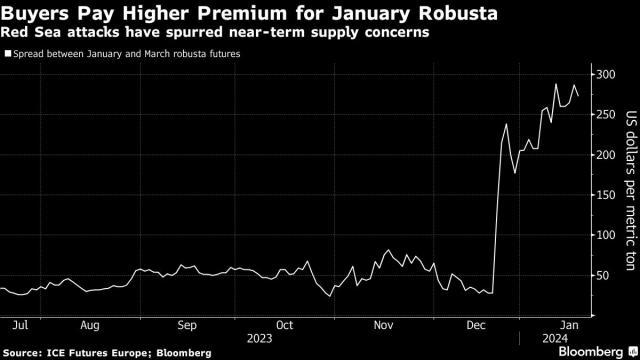The Red Sea turmoil that’s wreaking havoc on shipping is hitting the market for robusta beans, the variety used in instant coffee, and upending the usual flow of trade.
Buyers of robusta beans are shunning purchases from top producer Vietnam due to surging shipping costs and longer-than-usual travel times. They are instead seeking to secure more supplies from Brazil, according to people familiar with the matter who asked not to be named because the information is private.

Houthi militant attacks on merchant ships in the Red Sea have disrupted a key passage for coffee exports from Vietnam, forcing many commodity carriers to take longer routes. As a result, the premium robusta futures for January delivery command over the next contract surged more than 30% this month. That’s coming after a global shortage of the beans already helped drive up prices by almost 60% in 2023 amid dry weather in the Asian country.
“I could see the Red Sea stuff coupled with the drought in Southeast Asia leading to some global robusta market share moving to Brazil permanently,” said John Goodwin, a senior commodity analyst at ArrowStream Inc.
This isn’t the first time robusta trade through the Red Sea region has been disrupted. Two years ago, a vessel that blocked passage in the Suez Canal also upended markets.
In Vietnam, exporter Phuc Sinh Corp. has seen shipments slump since the Red Sea attacks broke out as shipping rates for goods sent into Europe from Asia jumped. The rates are up almost sevenfold to $4,000 per container, according to chairman Phan Minh Thong.
Still, while Brazil’s exports are on the rise, the country is nowhere near being able to fill the gap left by Vietnam, which produces more than a third of global robusta supplies.

Follow us on social media: